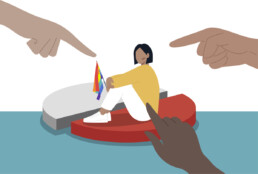Companies often encourage employees to express themselves as authentically as they can, with all the human vulnerability that comes with it — in other words, “bringing your whole self to work.” But our research reveals that for many businesses, there is still a long way to go.
In recognition of Pride Month, we recently conducted a survey of 1,000 Americans on the LGBTQIA spectrum — meaning that they self-identified as lesbian, gay, bisexual, transgender, queer/ questioning, intersex, asexual, or any combination therein — to learn more about how they navigate their own workplaces.
How do LGBT employees feel?
Out of those polled, more than a third (38%) described themselves as generally being very or completely open about their identity, with only 4% admitting to being “fully closeted.”
Despite that, 36% worry that they won’t get the same level of respect as their coworkers because of who they are. Another third (33%) worry about being bullied, and a fourth (25%) fear not even being hired in the first place.

Bringing your ‘whole self’ to work
When we dug deeper, it became clear that people still pick and choose when to bring their whole selves with them in different parts of their lives.
At work in particular, only one in five (18%) are open — and another one in five (19%) are closeted.
For the 20% of respondents who identified themselves as transgender, non-binary, genderqueer, intersex, or confused about their gender, the stakes are even higher. Compared to cisgender respondents, this group was less likely to be completely closeted at work (16% vs 20%), but also less likely to be open about themselves (34% vs 37%).
In fact, over half of the trans, non-binary and gender-questioning workers surveyed said they don’t feel comfortable being themselves at work — twice as many as the percentage of cisgender workers who said the same (25%).

What can workplaces do to help?
Overall, it seems that LGBT workers are treated more fairly now than they would have been even a few decades ago; two-thirds of those polled (65%) are protected under an employee code of conduct, and another third (30%) say their company has an equal opportunity policy for its employees.
One in five of the employers described by our panelists even celebrate Pride Month at the workplace, and 16% offer educational resources about sex and gender-based discrimination in the workplace.
There are still more meaningful improvements to be made
- 47% of respondents still believe that their workplace could be doing more to support transgender rights
- Only 14% of workplaces allow employees to publicly disclose their gender pronouns (via an email signature or name tag, for example)
- A measly 13% have made an effort to be more gender-neutral with dress code policies or bathroom facilities
Finally, 27% of respondents have no idea whether or not their employer’s health care plan would provide adequate coverage on gender-affirming treatments — an especially timely issue considering that some U.S. lawmakers have sought to criminalize access to such medication, at least among minors.
Where people are out
- Online (57%)
- Home (53%)
- School (45%)
- Health care facilities (44%)
- Public spaces (38%)
Where people are closeted
- Places of worship (38%)
- Private businesses (28%)
- Health care facilities (22%)
- Work (19%)
- Public spaces (18%)
Victoria McNally
This OnePoll online survey was conducted in June 2021, with a sample of 1,000 LGBTQ Americans. As members of AAPOR – the American Association for Public Opinion Research, OnePoll researchers adhere to the principles and actions set out in the AAPOR Code.
OnePoll delivers fast, flexible, robust research. Contact our team to discuss your research requirements.
Featured header image by Daniel James, Unsplash


